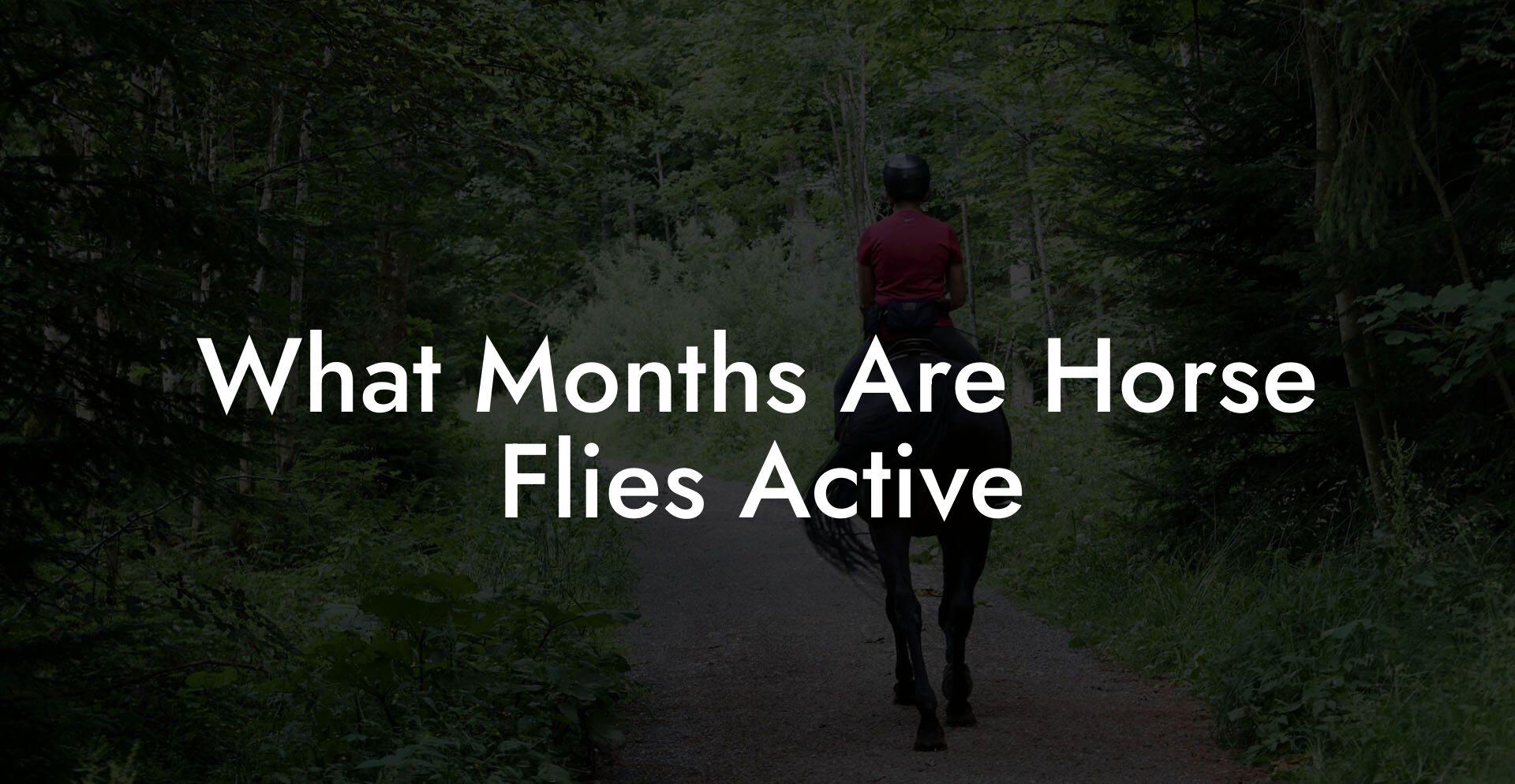Picture this: it’s a sunny afternoon at the barn, your horse trotting along contentedly, and suddenly you notice a swarm of pesky horse flies buzzing around like they’re auditioning for a role in a summer blockbuster. If you’ve ever wondered, “What months are horse flies active?” you’re not alone. Let’s dive into the wild, unpredictable world of horse flies, explore their seasonal antics, and uncover the best strategies to protect your equine friend, all while keeping things as down-to-earth and entertaining as a barnyard banter among your Gen-Z and millennial pals.
Quick Links to Useful Sections
- Understanding the Buzz: What Are Horse Flies and Why Do They Matter?
- The Science of the Buzz: Biology and Behavior of Horse Flies
- Seasonal Patterns: What Months Are Horse Flies Active?
- Spring Awakening
- Summer Standoff
- Early Fall Farewell
- How Horse Flies Impact Horse health and Behavior
- Preventive Measures: Keeping Horse Flies at Bay
- 1. Environmental Management
- 2. Physical Barriers and Protective Gear
- 3. Natural and Chemical Repellents
- Integrated Pest Management: A Holistic Approach to Horse Fly Control
- Components of an IPM Strategy for Horse Flies
- Equine grooming and Pasture Management: Practical Tips for Horse Owners
- Regular Grooming Routines
- Pasture Rotation and Dusting
- Creating a Fly-Friendly Environment Around the Stable
- Natural Remedies and DIY Projects for the Eco-Conscious Horse Owner
- Herbal Fly Repellent Spray
- Homemade Fly Traps
- Attracting Beneficial Insects
- Case Studies: Real Experiences from Horse Owners
- Case Study 1: Sarah’s Summer Showdown
- Case Study 2: Mike’s Multi-Pronged Approach
- Case Study 3: Emily’s Eco-Friendly Revolution
- Resources and Community Support: Your Next Steps
- Innovations and Future Trends in Horse Fly Management
- DIY Projects and Fun Experiments to Try at Home
- Expert Insights: Interviews with Veterinarians and Equine Specialists
- FAQ: Your Burning Questions About Horse Fly Activity Answered
- Your Path to a Happier, Fly-Free Equine Life
Understanding the Buzz: What Are Horse Flies and Why Do They Matter?
Horse flies are not your run-of-the-mill pests. These bloodsucking insects, notorious for their painful bites and relentless persistence, have been a thorn in the side of horse owners for centuries. Unlike your average house fly, horse flies (family Tabanidae) are larger, faster, and equipped with a mouthpart designed to cut through skin like a hot knife through butter. Their bites can lead to everything from minor irritation to severe allergic reactions, not to mention the risk of disease transmission.
Now, you might be thinking, “Why should I care about these flying fiends if my horse seems tough enough?” The answer is simple: horse flies can cause significant distress to your equine companions. Their aggressive feeding habits can lead to reduced grazing time, secondary infections from open wounds, and even stress-induced behavior changes. In short, understanding the life cycle, behavior, and seasonality of these pests is crucial for any horse owner looking to keep their four-legged friend happy and healthy.
In this pillar page, we’ll explore every facet of horse fly activity, from the science behind their seasonal peaks to practical tips for preventing infestations on your property. Get ready for a comprehensive guide that mixes cutting-edge research with a splash of humor, designed specifically for those who care deeply about the welfare of their horses.
The Science of the Buzz: Biology and Behavior of Horse Flies
Horse flies are fascinating creatures from a scientific perspective. They go through a complete metamorphosis that includes egg, larval, pupal, and adult stages. Most of the time, it’s the adult females you really want to worry about, they’re the ones with the painful bite because they need a hearty serving of blood to fuel egg production. The males, on the other hand, stick to sipping nectar, leaving the drama to their unfortunate female counterparts.
These insects thrive in warm, humid environments and are often found near bodies of water such as swamps, marshes, and even the damp corners of a well-worn stable. Their remarkable speed and agility make them hard to catch, and their compound eyes, which are a patchwork of colorful facets, are perfectly designed to spot that perfect target amidst the chaos of a busy pasture.
The behavior of horse flies is as unpredictable as your favorite viral meme. They hover, they dart, and, most importantly, they aren’t easily deterred by your best efforts to shoo them away. But fear not, as understanding their biology is the first step toward effectively managing their presence during peak months.
Seasonal Patterns: What Months Are Horse Flies Active?
Here’s the million-dollar question: When are horse flies most active? Though it can vary depending on your geographic location, climate, and local ecosystem, there are some general patterns that most horse owners can count on. Typically, horse flies are most active during the summer months, with their peak activity spanning from late spring to early fall.
Spring Awakening
As temperatures start to rise in late spring, the first generation of horse flies emerges from their winter hideaways. This season marks the beginning of their active period, where the combination of warming weather and increased moisture creates the perfect breeding ground.
During springtime, your fields and pastures become hotspots for these insects. Even a mild breeze can send them scouring the area in search of a snack. Though their numbers may not yet be overwhelming, it’s a sign that summer is just around the corner, with all the winged mischief that entails.
Summer Standoff
When summer rolls around, prepare for a full-on horse fly takeover. The warm and humid conditions combined with long daylight hours create an ideal environment for these buzzing nuisances. Their activity typically peaks in mid-summer, coinciding with high temperatures and an abundance of water sources necessary for larval development.
It’s during these sultry months that horse flies are at their worst. Their relentless buzzing can transform your quiet, pastoral mornings into a chaotic symphony of winged assaults. For the dedicated horse owner, this means taking preventive measures seriously, from strategic fly traps to natural repellents.
Early Fall Farewell
Just when you think the worst is over, early fall strides in with a bittersweet goodbye kiss from the horse flies. As the air cools and moisture levels begin to drop, their activity starts to decline. However, don’t get too comfortable, early fall can still feature enough horse fly action to warrant continued vigilance, particularly in regions with mild autumns.
In some areas, a second, smaller generation may even emerge before the cold sets in fully. In any case, by late fall, the horse fly population typically dwindles dramatically as the insects retreat to overwintering sites, awaiting the next cycle of warm weather.
In summary, if you’re asking “what months are horse flies active?”, the answer is generally: late spring, summer, and early fall. That said, keep in mind that local climates and microenvironments can shift these patterns slightly, so it’s wise to monitor your own pasture closely.
How Horse Flies Impact Horse health and Behavior
Let’s face it: nobody likes a pest, especially when that pest targets your horse. While the primary annoyance of horse flies is their painful bite, the ripple effects can extend far beyond temporary discomfort.
First, think about the stress factor. Horses, like us, are sensitive creatures. Constant harassment by horse flies can lead to stress, anxiety, and even changes in behavior. A horse constantly swatting and rear-ending to escape these bugs might end up with bruises or even develop a distrust of the outdoors.
Second, there’s the health concern. Horse flies can transmit various pathogens and parasites, including bacteria and protozoa, which in some cases can lead to serious infections. For a horse that’s already dealing with other health issues, the additional burden of a horse fly infestation can complicate recovery and overall well-being.
Moreover, these insects disrupt feeding and resting patterns. When a horse is too busy dodging flies, it might skip meals or not rest properly, affecting its nutritional intake and overall stamina. Over time, this chronic stress and disruption can compromise the immune system, making the horse more susceptible to other ailments.
So, whether it’s the immediate effects of a painful bite or the longer-term health implications, managing horse flies is an essential part of caring for your horse. Prevention isn’t just about avoiding irritation, it’s about safeguarding your companion’s health and ensuring a happy, balanced life.
Preventive Measures: Keeping Horse Flies at Bay
Now that we know when these pesky insects are most active and why they matter, the next logical question is: What can we do to protect our horses? Fortunately, there are several practical and creative strategies to minimize horse fly encounters on your property.
1. Environmental Management
The first line of defense is often right outside your stable. Horse flies love wet, wooded, and humid environments. By reducing excess moisture and managing vegetation around barns and pastures, you can create a less attractive habitat for these insects.
- Drainage and Irrigation: Ensure that water does not pool near your stables or in the fields where your horses graze. Proper drainage systems can be a game changer in reducing breeding grounds for horse flies.
- Vegetation Control: Regular mowing and clearing of tall grass and brush helps disrupt the ideal environment for these pests, forcing them to disperse rather than setting up shop near your horses.
- Buffalo Grass and Natural Barriers: Consider planting native grasses or other vegetation that is less appealing to horse flies. Some studies suggest that certain plants have natural repellent properties which can reduce insect activity.
2. Physical Barriers and Protective Gear
When it comes to direct protection, physical barriers can offer your horse a much-needed shield against the relentless onslaught of horse flies.
- Fly Masks and Sheets: Specialized fly masks, sheets, and fly rugs are designed to cover vulnerable areas on your horse, significantly reducing their exposure. Look for products that offer UPF protection and breathable fabrics to keep your horse comfortable in the heat.
- Stable Screens and Fans: For indoor facilities, installing screens around open areas and using fans can create an environment that is less inviting for flies. Fans, in particular, can disrupt the flight patterns of these agile insects, making them less likely to zero in on your horse.
- Electronic Fly Traps: Modern technology isn’t just for smartphones. Electronic and UV light-based fly traps can be strategically placed around stables and pastures to lure in and zap these pests away before they become a problem.
3. Natural and Chemical Repellents
For many modern horse owners, the solution to a pesky problem can be as simple as a spritz of nature’s own insect repellent. Whether you lean towards organic methods or don’t mind a little chemical assistance, there are several options available.
- Citrus-Based Sprays: Natural repellents that incorporate essential oils like citronella, eucalyptus, and lemongrass can confuse and repel horse flies. These are particularly appealing to owners who prefer green solutions that minimize toxicity.
- Neem Oil: Another powerful natural insect repellent, neem oil works by interfering with the feeding habits of insects. Dilute and apply it around the stable area for an eco-friendly approach to discouraging horse flies.
- Synthetic Insecticides: For more severe infestations, synthetic insecticides might be necessary. Always select products that are safe for use around horses, and follow the manufacturer’s guidelines to avoid any unintended harm.
Combining these strategies, environmental tweaks, protective gear, and repellents, often yields the best results. Remember, a layered defense is typically more effective than relying on one single method.
Integrated Pest Management: A Holistic Approach to Horse Fly Control
Just as holistic strategies are applied to human health, integrated pest management (IPM) is a multipronged approach that brings together various methods to control pests in a sustainable way. For horse owners, IPM means blending environmental, biological, and chemical tactics while keeping in mind the welfare of your horses and the ecosystem.
IPM isn’t about completely annihilating the insect population (which, frankly, is nearly impossible) but about keeping numbers low enough that your horse can enjoy its day without being bucked off by a swarm. By understanding the life cycle of horse flies and implementing targeted interventions during their peak active months, you can reduce both direct exposure and the long-term impact on your horse’s health.
Components of an IPM Strategy for Horse Flies
- Monitoring: Keep a close eye on horse fly activity in your area by using simple trapping methods or even mobile apps designed to track pest populations. This data can inform you when to intensify control measures.
- Cultural Controls: Modify your environment, improve drainage, reduce standing water, and manage vegetation, to make your property less conducive to breeding and survival of horse flies.
- Biological Controls: Introduce natural predators such as birds, bats, and beneficial insects that prey on horse flies. Encouraging such species can create a natural balance, keeping the pest population under control.
- Chemical Controls: Use repellents and insecticides judiciously, ensuring they’re specifically targeted to minimize harm to non-target species and your beloved horse.
Integrated pest management highlights the importance of a balanced approach, using a combination of smart monitoring, environmental adjustments, and occasional chemical interventions to keep horse flies at bay without turning your farm into a chemical wasteland.
Equine grooming and Pasture Management: Practical Tips for Horse Owners
While we’ve covered the science and strategies behind confronting horse flies, let’s get into the nitty-gritty of everyday management. For a Gen-Z or millennial horse owner juggling a busy life, practical, hands-on tips can make all the difference in keeping those annoying flies away while ensuring your horse thrives.
Regular Grooming Routines
Consistent grooming not only keeps your horse looking fabulous at the show ring but also provides a prime opportunity to check for bites and fly damage. When brushing and inspecting your horse, keep an eye out for red, irritated skin that may indicate a recent fly attack.
Some savvy owners even incorporate natural fly repellents into their grooming routines. A quick spritz of a neem or citrus-based solution on areas prone to horse fly bites can provide an extra layer of protection. Plus, your horse gets the double treat of a spa-like pampering session, talk about a win-win!
Pasture Rotation and Dusting
Creating a rotation plan for your pastures not only optimizes grazing but can also disrupt the life cycle of pests like horse flies. By rotating your horses to drier, well-maintained fields, you reduce the chance that they’ll encounter high concentrations of flies.
Dusting your horse with safe, natural powders (such as diatomaceous earth) can help deter horse flies while also providing relief from other irritating insects. This method is particularly effective during the summer standoff, when every little bit helps in the fight against flying nuisances.
Creating a Fly-Friendly Environment Around the Stable
Surround your stable with elements that minimize the attraction of horse flies. Strategic planting of fly-repelling herbs like lavender, basil, and rosemary can work wonders. These plants not only add a splash of color but also create a natural barrier that discourages horse flies from settling in.
Additionally, designate specific zones for feed, water, and resting areas away from heavily wooded or damp spots. By separating these functional zones, you can manage each area more effectively, and ensure that your horse has a safe haven away from the worst of the fly frenzy.
Natural Remedies and DIY Projects for the Eco-Conscious Horse Owner
Let’s be honest, sometimes, the best solutions are the ones you can whip up in your own barn. For the eco-conscious horse owner who wants to minimize reliance on harsh chemicals, natural remedies and DIY projects can be both cost-effective and surprisingly effective.
Herbal Fly Repellent Spray
Create your own herbal fly repellent by combining essential oils such as citronella, lavender, and eucalyptus with water and a touch of witch hazel. A few sprays on your horse’s coat before turnout can provide temporary protection from horse flies. It’s a natural, eco-friendly, and budget-friendly approach that aligns perfectly with the sustainable lifestyle many millennials cherish.
Homemade Fly Traps
Why not turn your love for DIY into a battle strategy against horse flies? Homemade fly traps using simple household items like plastic bottles, sugar water, and vinegar can be surprisingly effective at luring in and trapping flies. Experiment with different recipes until you find the perfect mix to keep your barn a fly-free zone.
Attracting Beneficial Insects
As counterintuitive as it might seem, inviting some insect “friends” to your pasture can help keep horse flies in check. Ladybugs, lacewings, and certain parasitic wasps are natural predators of many lesser pests. Creating a mini garden with native flowering plants can attract these beneficial bugs, adding another layer of natural defense to your integrated pest management strategy.
Whether you’re a seasoned DIY enthusiast or just looking for creative ways to blend sustainability with horse care, these natural remedies underscore a simple truth: combining modern knowledge with time-tested traditions can yield some of the most effective, and satisfying, results.
Case Studies: Real Experiences from Horse Owners
Sometimes, the best advice comes not from textbooks, but from the lived experiences of fellow horse owners. Let’s take a look at a few real-life case studies that demonstrate the ups and downs of dealing with horse flies, and how proactive measures made all the difference.
Case Study 1: Sarah’s Summer Showdown
Sarah, a young horse enthusiast living on a sprawling suburban farm, was tired of watching her prized mare suffer during mid-summer turnout. After noticing that the horse fly activity peaked every day between 11 a.m. and 4 p.m., she implemented several new strategies: she upgraded to a high-quality fly mask, invested in an electronic fly trap around the pasture perimeter, and began using a homemade herbal spray. Within a month, Sarah reported far fewer instances of fly-induced distress, and her mare was noticeably calmer. “It was like turning the volume down on a chaotic summer playlist,” Sarah quipped. Her experience is a testament to the power of combining practical gear with DIY ingenuity.
Case Study 2: Mike’s Multi-Pronged Approach
Mike, a millennial horse owner with a penchant for technology, decided to tackle the horse fly problem using an integrated pest management approach. He started by installing UV light traps around his barn and improving pasture drainage with the help of local experts. Mike also dedicated time to researching natural repellents and ultimately created a custom fly repellent blend using citrus and eucalyptus oils. His tech-savvy monitoring system, complete with weather apps and fly population tracking, allowed him to time his interventions perfectly. The result? A consistent decrease in fly encounters and a happier, more relaxed horse.
Case Study 3: Emily’s Eco-Friendly Revolution
For Emily, sustainability isn’t just a buzzword, it’s a lifestyle. Determined to keep her beloved stallion safe from the incessant biting of horse flies without compromising her eco-friendly values, she embarked on a project to convert her stable into a natural fly-free zone. Emily planted fly-repelling herbs, built DIY fly traps, and even installed solar-powered fans to disrupt the flies’ flight patterns in the stable area. Her efforts paid off, and not only did she reduce the number of horse flies, but she also created a healthier and more organic environment for her horse and the entire farm.
These case studies illustrate that when it comes to managing horse flies, a little creativity goes a long way. Whether you’re tech-driven, DIY-oriented, or passionate about organic living, there’s a strategy out there to suit your unique needs.
Resources and Community Support: Your Next Steps
Caring for your horse is a journey best taken together. Beyond the practical tips and scientific insights, tapping into the wealth of knowledge offered by communities, online forums, and equine specialists can be incredibly empowering. If you’re curious about more advanced techniques or just need a sounding board for your latest experiment with homemade repellents, consider joining local equine groups or online communities dedicated to horse care.
Here are some resources to get you started:
- Equine Health Forums: Participate in online discussion boards where experienced horse owners share tips on seasonal pest management and natural remedies.
- Local Veterinary Associations: Reach out for workshops and seminars dedicated to integrated pest management and horse health.
- Social Media Groups: Join Facebook, Reddit, or Instagram communities where modern horse owners trade advice, DIY projects, and success stories on keeping horse flies in check.
- Equestrian Blogs and Podcasts: Stay updated on the latest trends in horse fly control and equine health management through engaging and informative online content.
These resources not only provide practical advice, but they also remind you that you’re part of a larger community of horse lovers committed to ensuring that every trot, canter, and gallop happens without the unwelcome interference of pesky horse flies.
Innovations and Future Trends in Horse Fly Management
The battle against horse flies is rapidly evolving, and innovations in technology and research are paving the way for even more effective methods. From advanced biofeedback systems in integrated pest management to the development of new natural repellents derived from local botanicals, the future of horse fly control is looking bright.
Emerging research is exploring the genetic makeup of horse flies, aiming to identify weaknesses and vulnerabilities that could lead to targeted, long-term solutions. Additionally, smart sensor technology is being used to monitor pest activity in real time, allowing for immediate adjustments in management strategies. Imagine an app that notifies you of a sudden spike in horse fly activity, complete with personalized intervention tips and automated fly trap activation. Innovative, right?
Staying informed about these trends isn’t just for the scientists and tech gurus, it’s for every horse owner who believes in a proactive, science-backed approach to animal care. Embracing innovations can enhance your ability to protect your horse and maintain a harmonious, bug-free environment on your property.
DIY Projects and Fun Experiments to Try at Home
Who says managing horse flies can’t be fun? For those who like to roll up their sleeves and get creative, there are plenty of DIY projects that not only serve a practical purpose but also add a dash of excitement to your daily routine. From crafting custom fly traps to developing natural repellents, these fun experiments can become an engaging hobby, and maybe even a neat conversation starter at the local equine meet-up.
One popular project involves creating a solar-powered fly trap using recycled materials. Not only does it help control the fly population, but it also puts your sustainable skills on display. Another idea is to host a “DIY Horse Fly Science Night” with fellow horse owners, where you experiment with different natural repellent recipes and compare results. These activities not only contribute to better horse care but also strengthen the bond within your equine community.
Expert Insights: Interviews with Veterinarians and Equine Specialists
In our quest to provide you with the most comprehensive guide to understanding what months are horse flies active and how best to manage them, we reached out to experts in the field. Veterinarians and equine specialists have shared valuable insights that range from immediately actionable tips to long-term strategies for maintaining equine wellness.
Dr. Nicole Ramirez, a renowned veterinarian, explained, “Horse fly season is largely dictated by climate. Warmer, humid conditions from late spring through early fall are when you’ll see the highest levels of activity. It’s crucial for horse owners to monitor local weather trends and adapt their prevention measures accordingly.” She further recommended integrating regular grooming with natural repellents and protective gear to reduce the incidence of bites.
Meanwhile, equine behaviorist Kyle Matthews emphasized, “A stressed horse is more susceptible to health issues. When managing horse flies, it’s important to balance preventive measures with the comfort and emotional well-being of the horse. Simple interventions, like scheduling turnout during the cooler parts of the day, can make a big difference.”
These expert interviews underline a key takeaway: effective horse fly management is not a one-size-fits-all solution, it’s a tailored, dynamic approach that combines science, technology, and a bit of creativity.
FAQ: Your Burning Questions About Horse Fly Activity Answered
Below, we’ve compiled a list of frequently asked questions about horse fly activity, complete with in-depth answers that are sure to clear up any lingering doubts.
1. When are horse flies most active?
Horse flies are typically most active from late spring through early fall, with peak activity in the warm, humid conditions of mid-summer.
2. How can I effectively protect my horse from horse flies?
Effective strategies include using fly masks, fly sheets, environmental management (e.g., drainage and vegetation control), and natural or chemical repellents. Creating a layered defense system is key.
3. Do horse flies only target horses?
No, while horse flies are notorious for attacking horses, they can feed on a variety of mammals, including cattle, dogs, and even humans.
4. Can natural remedies really keep horse flies away?
Yes, many aspects of natural pest control, such as citrus-based sprays, neem oil, and planting fly-repelling herbs, have proven effective in reducing horse fly encounters.
5. What causes the seasonal surge in horse fly populations?
The seasonal surge is largely related to climatic conditions. Warmer temperatures and higher humidity levels provide ideal breeding conditions for horse flies.
6. Are there technological innovations to help monitor or control horse flies?
Indeed, smart sensor technology, electronic fly traps, and mobile apps are all part of a modern approach to monitoring and managing horse fly populations.
7. Can horse fly bites transmit diseases to my horse?
Although serious diseases are rare, horse fly bites can lead to localized irritation, stress, and in some cases, secondary infections.
8. How do I know if my horse is suffering from excessive horse fly bites?
Signs include excessive tail flicking, subpar performance during turnout, irritated or swollen areas on the skin, and changes in grazing behavior. Regularly checking your horse after outdoor time is key.
9. What role does integrated pest management (IPM) play in controlling horse flies?
IPM combines environmental management, biological controls, and selective chemical treatments to reduce horse fly populations in a sustainable manner.
10. Are there any preventative measures that are particularly effective during specific months?
Yes! In late spring, focus on reducing breeding grounds and early detection, while during mid-summer, maximize the use of protective gear and fly traps. Early fall is all about maintaining a clean, dry environment and monitoring the remaining fly activity.
Your Path to a Happier, Fly-Free Equine Life
Taking control of the horse fly challenge is about more than just swatting away the annoyance, it’s a commitment to creating a thriving, healthy environment for your horse. By understanding the seasonal patterns of horse fly activity, implementing sound preventive measures, and leveraging both modern technology and DIY ingenuity, you’re well on your way to winning back those golden hours of peace on the pasture.
Every step you take, from adjusting grazing schedules to fine-tuning your integrated pest management strategy, contributes to a better quality of life for your horse. And when your horse is comfortable, happy, and thriving, it reflects positively on you as a dedicated, forward-thinking caregiver.
So, whether you’re a long-time equine enthusiast or a new rider excited to learn the ropes, embrace the challenge as an opportunity to innovate and connect with a passionate community. Remember, each season brings its own set of challenges and victories, and with the right approach, even the pesky horse flies can be managed with confidence and a sense of humor.
Your journey to a fly-free, stress-reduced, and happy equine lifestyle is full of learning and growth, one swat at a time. Embrace the process, celebrate your small victories, and always keep a smile (and maybe a fly swatter) handy.













